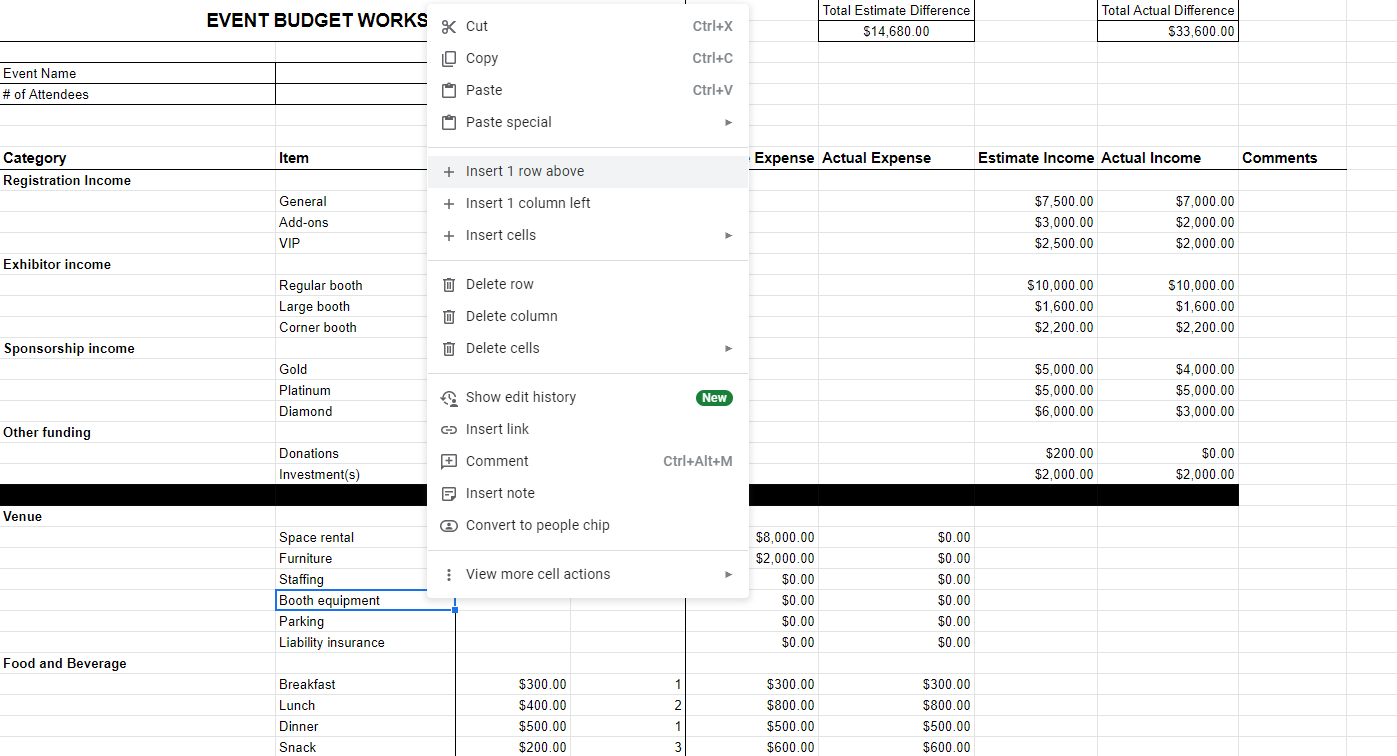Dec 16, 2025
It would be wonderful to live in an event planning world where every step in the planning process came at no cost, and the word “budget” didn’t exist. Unfortunately, event organizers face the reality that running a single event is essentially like running an entire business.
Your event budget is the backbone of your planning management, as every bit and piece of the event requires a money source. Most event planners aim for a good return on their investment, whether that means a satisfied audience and no money lost or earning a profit from the event. Conferences and similar event types typically try to maximize the event’s sources of income to offset the large number of expenses by collecting money from attendees, exhibitors, and sponsors. Keeping track of all this spending, and income can be difficult and overwhelming. This is where a strong event budget plan can help alleviate some stress.
What is an event budget?
An event budget is a comprehensive estimation of costs and revenue or a forecast of how you’ll spend and what you’ll earn. A standard event budget can include your event’s projected income and expenses, as well as what your event’s actual income and expenses are. It is important to visualize and have these values written down and estimated before the event starts in order to predict how the event will fare financially.
Any event organizer that doesn’t work with an event budget will find it nearly impossible to determine whether there will be an ROI, or if they will have enough money to run the event. This could make for a disastrous outcome that could draw comparisons to Fyre Festival.
All successful event planners and organizers use an event budget. Well-organized event budgets are necessary to make decisions that will help save or earn funds that will ultimately go back into the organization and make the next event even better.
Common Items of an Event Budget
It’s necessary to disclaim upfront that not all events are the same, especially right now, as some events are being held in person, and others are virtually or hybrid. This means that event budgets will not be exactly the same for any event, and it’s up to you as an event planner to figure out the best structure and composition of your event budget.
Download Event Budget Template
As you start to fill out your event information, you’ll want to make an accurate estimate (better to overestimate) of the number of attendees you’ll have. This can help account for an estimated income from ticket sales or registration, as well as many of your expenses like food and venue. Once you are done making estimates for income and expenses, you will want to fill in the numbers of actual income and expenses as they transpire. Each time an item’s actual income or expense is complete, that item’s estimated income or expense should be recorded in the budget as the actual income/expense.
Sources of income
When figuring out the budget for your event, it is beneficial to see the cash that you will be potentially working with when you start to estimate and finalize your expenses.
If you’re fortunate enough, your event will have some initial investment or seed money to start off with. For certain events like academic conferences, you may be lucky enough to collect funds from donors who are inclined to help.
Other sources of income for your event can come from attendees, sponsors, and exhibitors. Selling tickets for attendees, booths for exhibitors, and packages for sponsors can help bring in money that can be allocated to your event expenses.
Venue costs
Whether your event is held physically in-person, or on a virtual platform, no event can take place without an event space. Therefore, the first costs you will need to consider are those associated with the venue. Renting the venue space will likely be one of the largest costs of your event (if not the largest). You will need to account for the number of attendees you expect to be present at the event when choosing potential venues. Staff and possibly vendor compensation will also be a major cost for most events unless you can use volunteers. Other costs relating to the venue can include furniture, booth equipment, parking, and liability insurance. Liability insurance is extremely important to protect you and your organization from damage or injury claims.
If you are hosting a virtual event, you won’t have to worry about onsite costs, but you will have to think about remote staff, technical support, and the cost of a virtual event space. Get pricing quotes from multiple event management platforms, such as Whova, to get the right price with only the necessary online tools for an engaging virtual experience.
Food and Beverage
Food and beverage are not technically essential costs, as you could run an event without providing your attendees with any complementary consumables. However, it’s no secret that providing food and beverages will make for a more pleasant event experience and subsequently keep your attendees inclined to return to future events. Providing meals is expected by conference attendees, and it’s an easy way to show them that you want them to enjoy their time at your event, so if you opt-out of this expense it’s safe to assume your ticket sales will be lower.
To calculate your food and beverage costs, you’ll want to keep track of the number of meals you promise to serve and the catering cost for that meal. Some venues will offer their own catering services, the cost of which they’ll include in the venue charge.
A/V and Technology
There are a number of different costs that will come with the technology needed for your event. The Audio/Visual component of the event can be provided in various ways. One option is to rent technical equipment and hire an independent technician to work on your staff and operate it during the event. Alternatively, you could pay for the services of a production company that will provide and handle all of the A/V equipment necessary for the event. There is also a possibility that your venue will provide A/V equipment that you will be able to borrow, in which case you may need to hire a technician to operate the equipment in-house.
Other technology costs may come from providing stable WiFi onsite, designing your event website, hiring a videographer, fees charged by online registration systems, and more. Another event technology expense could be the cost of an event app, which, if used, may actually alleviate other event expenses. For example, the Whova event app and event management platform provide organizers with an event website, tools for marketing, the capability to distribute documents/handouts digitally, as well as enhance the overall experience for both attendees and organizers. Request price quote today.
Marketing
Unfortunately, persuading people to buy tickets to the event will actually cost you some money. Event marketing tools and strategies come at a range of different costs. It’s a good idea to start with the cost-efficient options available to help spread the word about your event, like utilizing social media channels. If you want to boost your event’s visibility further, you can advertise it, print and hang posters up locally, or pay for a service that can share your event details through email campaigns to a large contact list.
Event marketing shouldn’t be limited to the lead-up to your event. It’s important to maintain a marketing mindset during the event itself, to set yourself up for success at future events. One way you can do this is to hire an event photographer to capture event highlights, which will for Good PR. You can also print and hand out a program or brochure at your event to give the attendees a better understanding of what they can do at your event. Event apps like Whova can help facilitate event promotion by having photo sharing options, and program details all in one place.
Attendees and Speakers
Expenses will arise from providing accommodations for your attendees, as well as your speakers. Featuring highly reputable speakers at your event will help attract attendees and enhance the experience, which is why it’s especially important to provide strong incentives for potential speakers. Effective incentives for speakers will not be cheap, so it’s important to factor these costs into your event budget. Providing speakers with free lodging, taking care of their transportation needs, offering gifts, or even offering payment, are some options for compensation that will definitely help convince sought-after speakers to present at your event.
Download Event Budget Template
Attendees will not need as many generous perks as speakers unless of course, they are on the VIP list of attendees. Generally speaking, additional costs for attendees should only include things like name badges, small gift bags, conference t-shirts, pens, or other merchandise. Providing attendees with complimentary conference swag is a great way to promote your event for the future. You also have the option to create ticket add-ons for conference merch to help generate more to get more revenue directly from your attendees.
Miscellaneous expenses
Once the estimated income budget is set, it’s important to reserve roughly 20% of the total estimated income to account for the estimated contingencies expense. While planning a detailed budget will help you stay organized with your finances, it’s impossible to be prepared for all of the unexpected costs that can arise before or during the event. For example, venue plans falling through or A/V equipment breaking at the last minute are unlikely, but always possibilities that would completely throw off your event. Planning for everything that could possibly go wrong and allocating backup funds for these possibilities is essential. The general rule for contingencies is: Less detail in the event budget = more funds allocated to contingencies.
Other miscellaneous expenses could go towards extra supplies or any other pre-conference or post-conference fees that do not fit into any category.
How to avoid mistakes when utilizing the event budget template (on Google Sheets)
Editing an event budget template can actually be quite tedious and difficult to figure out. Below we provide some tips on how to edit, add, and remove items on our budget template.
Adding an item
Adding an item is quite simple. First, right-click on the cell directly below where you want to add an item and then click on ‘insert row above’. This will create a new row of cells where you’ll be able to fill in the item and value(s) associated with it.
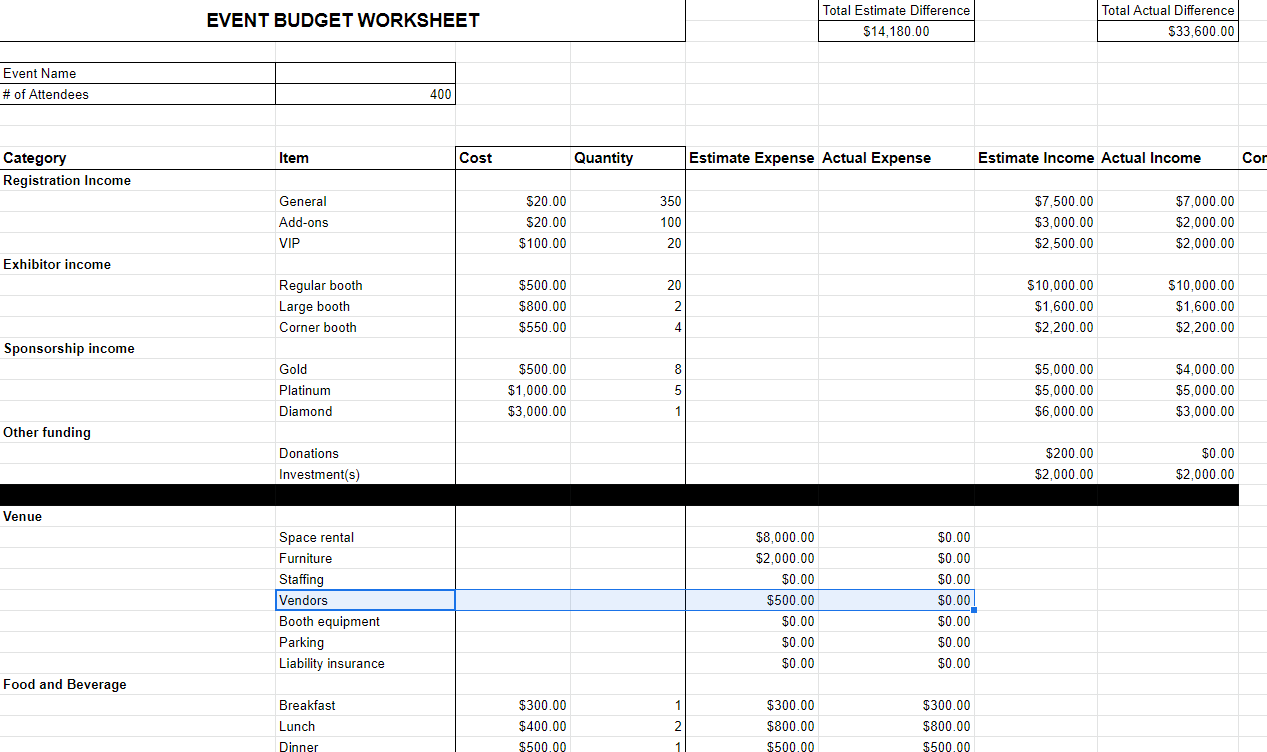
Implementing cost & quantity
Some expense and income values are easier to calculate by multiplying quantity and costs, and it’s relatively easy to carry out this calculation. For example, let’s say you have to pay $5 per parking spot at your event’s venue, and you need 300 parking spots for the event. See how to make the calculation in Google Sheets below.
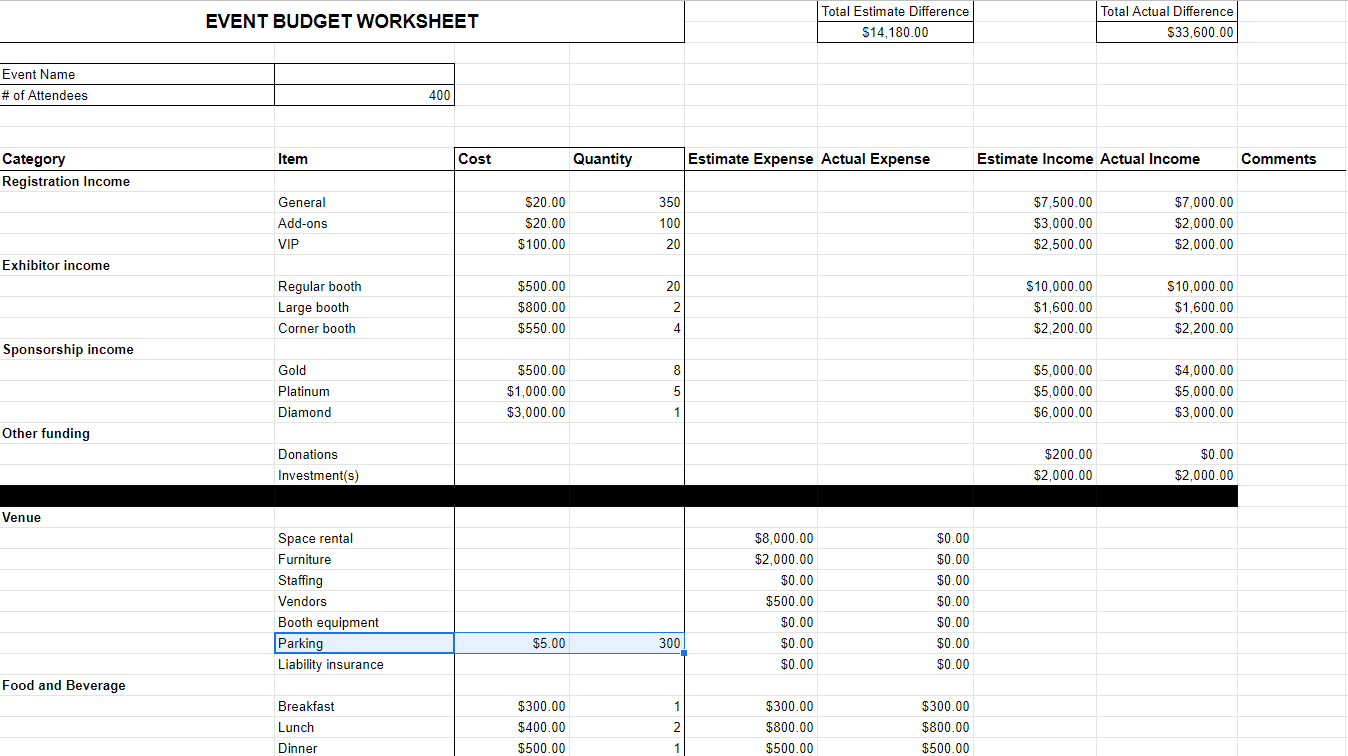
In the estimated expense column, type in ‘C(corresponding row number)*D(corresponding row number)’. So if the row number is 31, type in ‘C31*D31’ in the estimated expense column (since it has not been paid for yet). Then hit enter.
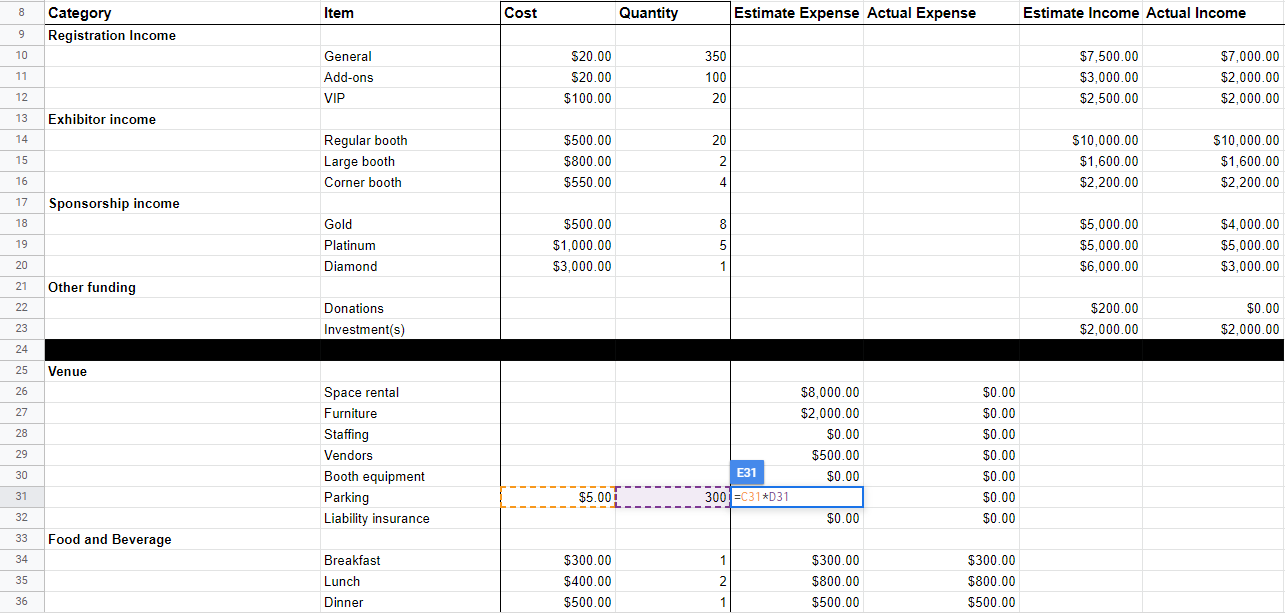
Once you have paid for the parking in full, you can come back into the event budget and add the actual amount paid, which should match the estimated amount. You can do this by either putting the same formula into the cell or typing in the matching value.
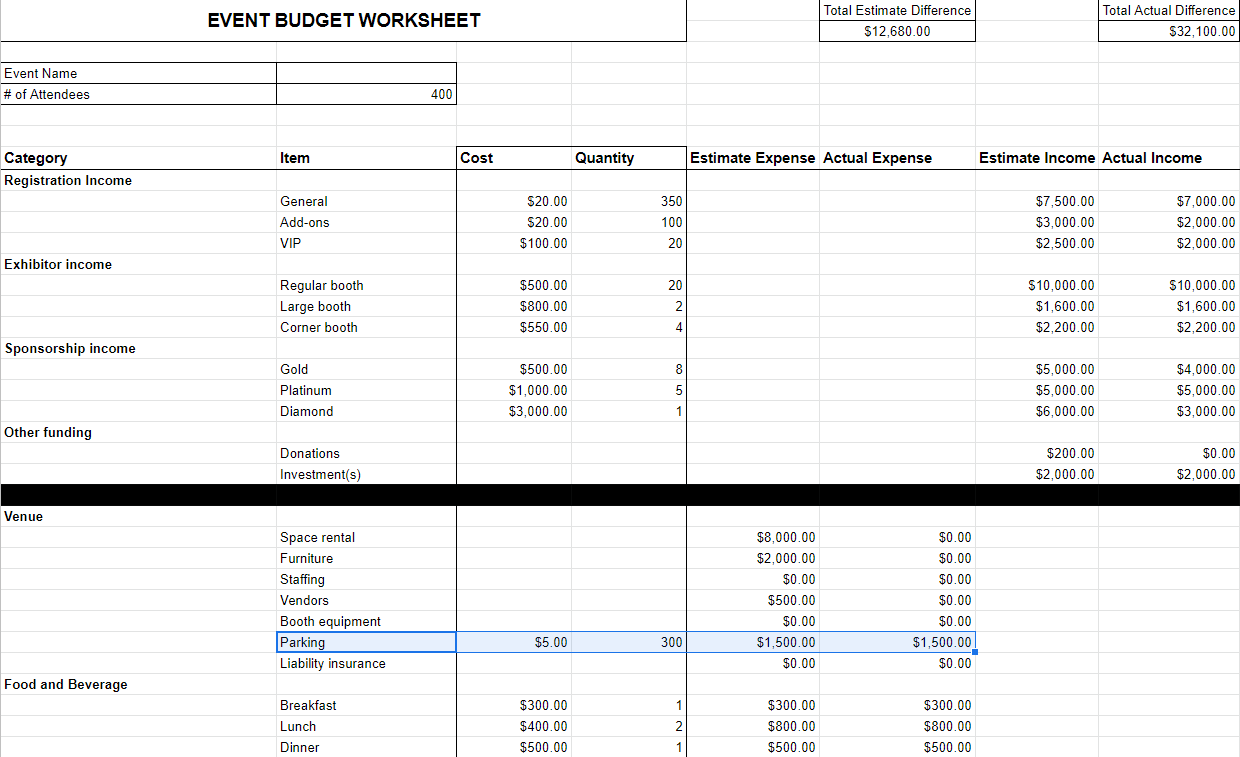
Removing an item
This is probably the easiest task to do of the three. To remove an item from the event budget, all you have to do is right-click the item you want to remove and then click ‘delete row’
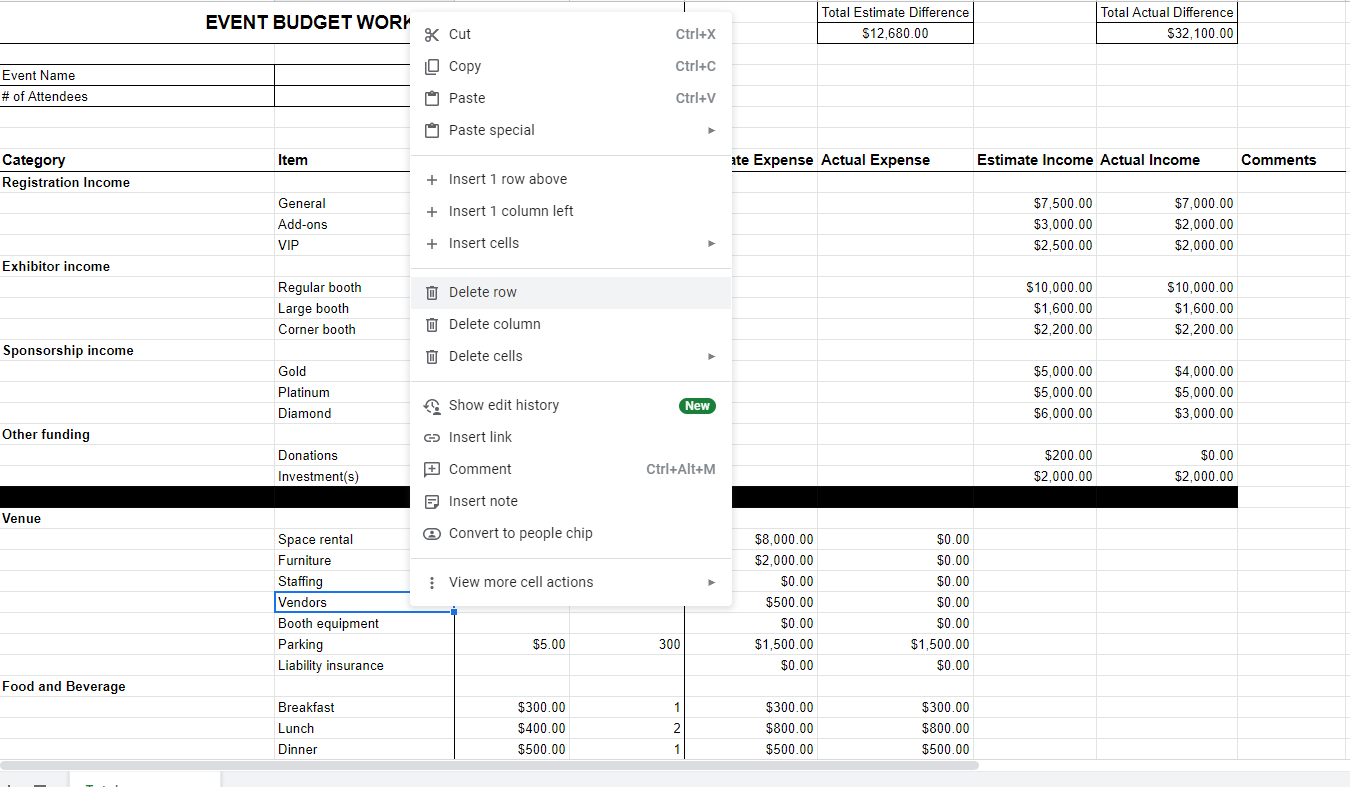
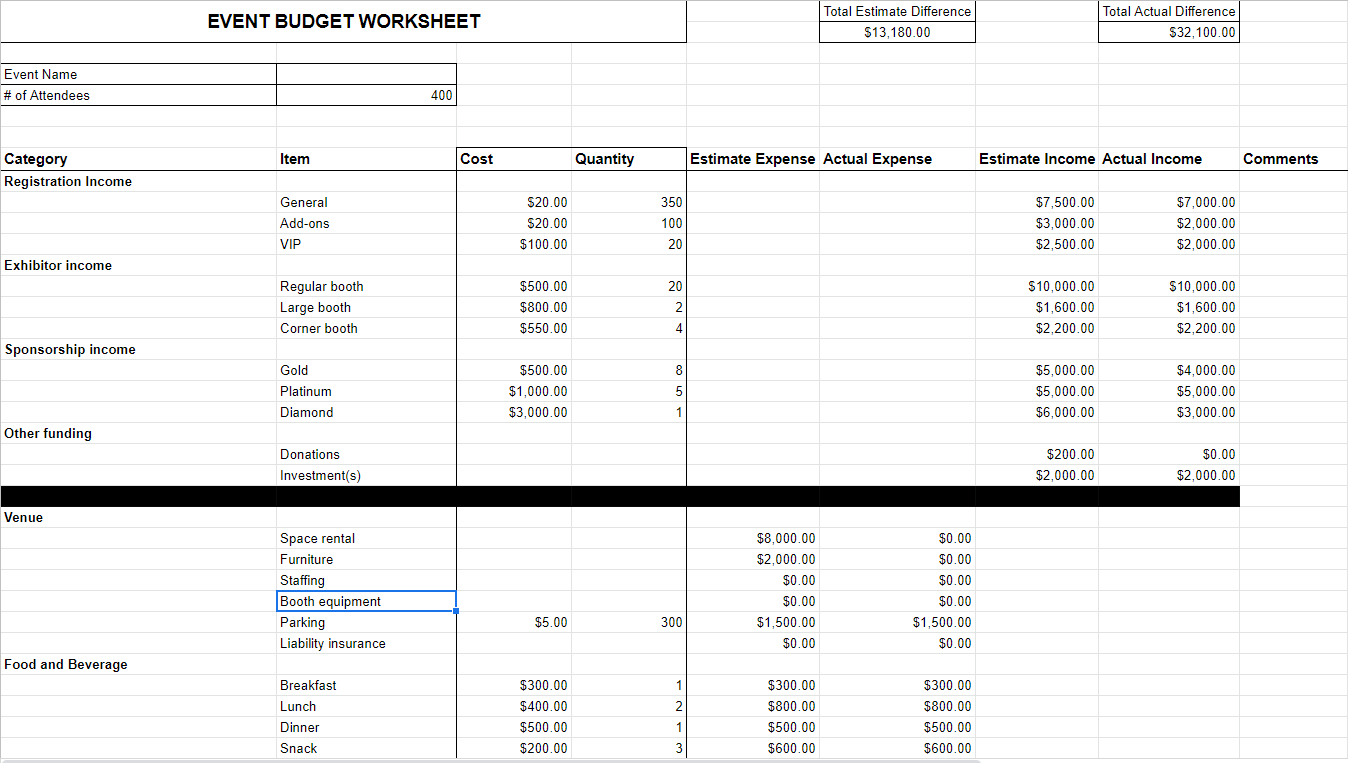
Download Event Budget Template
Working with an event budget is an essential part of the event planning process, regardless of your event format or size. Overspending on an event has harmful impacts on the organization hosting the event, and even the event planner themself, potentially causing both to lose lots of money. To avoid this, the best event organizers budget diligently and ensure the chance of overspending is negligible. If you are looking to plan an event or know someone that is, check out this event budget template above!

